A coded warning to the world’s senior football directors is tucked neatly into Prince Ali of Jordan’s manifesto in his bid to oust Sepp Blatter as president of world federation FIFA.
Prince Ali bin Al Hussein, outgoing Asian FIFA vice-president and a graduate of Sandhurst Royal Military Academy, is fighting seeking to prevent the 79-year-old Swiss from winning a fifth term in office.
Manoeuvres this week included the manifesto launch and meeting with African football officials alongside CAF Congress in Cairo.
Fellow candidates Michael Van Praag, the Dutch federation president, and Portugal’s former World Player of the Year Luis Figo have already unveiled their proposals. Unlike them Prince Ali has rejected the favour-currying ‘pledge’ route over development cash and World Cup slots.
Quite the opposite. Prince Ali’s manifesto rejects simplistic specifics in favour of a philosophical governance vision which might usefully be adopted not only within FIFA but across a swath of other international sports federations.
One standout point picked up by supporters and critics alike has been his warning that sponsors will continue to run away from FIFA and into the arms of other sports while the world federation’s image and perception remains at rock-bottom level.
Prince Ali says: “The damage which is being exacted upon ‘Brand FIFA’ has financial implications. Sponsors have begun to vote with their feet. If drastic action is not taken urgently to restore the image of our governing body, we can expect revenues to reduce and, in turn, monies available to national associations to also go down.”
In follow-up interviews he added: “We should have a situation where sponsors are not only willing to come back but should be fighting to sponsor FIFA.”
But more lies behind Prince Ali’s concern that FIFA’s World Cup-linked sponsor revenues will dip.
He must hope leaders of the world’s 209 national associations will awaken to the unwritten conclusion that a continuation of the Blatter regime means the days of their FIFA handouts are drawing to a close.
Hence the attraction of Prince Ali’s proposals for a more structured approach to development support and one which does not depend, as he notes, “on FIFA a president’s approval.” This latter jibe referred clearly to the multi-million ‘World Cup bonuses’ which have been handed out annually to keep national associations and confederations happy ever since the 2010 finals in South Africa.
Even Blatter has shrunk back from now from making the confirmatory announcement himself. This congress duty has now been devolved to finance director and deputy general secretary Markus Kattner though Blatter’s ‘signature’ is all over the strategy.
Prince Ali’s manifesto, entitled A FIFA Worthy of the World Game, sets out a mission statement of “daring to imagine a future in which we are the very best we can be [targeting] development programmes stimulating unprecedented growth and improvement in football around the world.”
Section One deals with the “virtuous circle of development, football and commercial success” and draws on feedback from FAs wanting “a FIFA development programme which is transparent, fair, generous and flexible and which delivers support where it is most needed.”
Here, again, is an unwritten hint that aid should not be delivered where it is needed to garner votes. This comment also harks back to Prince Ali’s stated concern, in launching his campaign in London back in January, about a “culture of intimidation” within FIFA.
Of course he wants more investment in women’s football and the youth world cups plus the creation of regional development offices to both support and police the use of FIFA funds.
Prince Ali endorses a wide-ranging review of the possible use of additional technological support for officials while cautioning that, as with World Cup expansion, FIFA should not rush into hasty, ill-researched decisions.
Section Two of the manifesto deals with the game and corporate responsibility (youth trafficking, discrimination, doping etc) leading to a conclusion appealing for “the honour” of member associations’ support.
One notable point is that Prince Ali drops the regal titles and presents himself simply on the manifesto as “Ali Al Hussein” . . . underlining his favoured theme that FIFA and its directors are not there to govern from on high but to serve.







